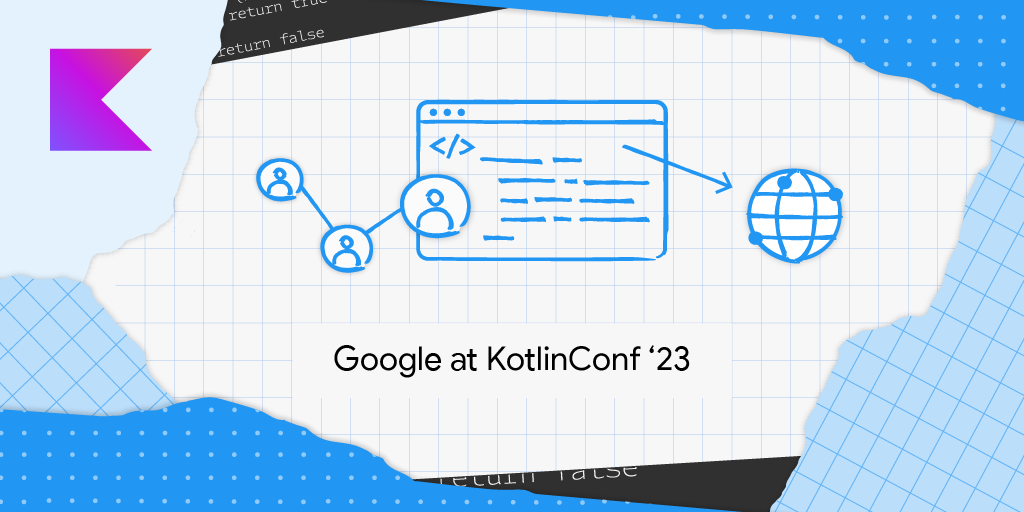Posted by Márton Braun, Developer Relations Engineer
As part of Google’s ongoing commitment to supporting the Kotlin language, we are really excited to be a gold level sponsor for KotlinConf again this year. Grace Kloba shared the story of Google’s investments in Kotlin within the keynote, which is recapped in this post. You’ll also find the list of talks by Google from the event’s schedule below, make sure you catch these on the live stream.
For a summary of all KotlinConf keynote announcements, read the blog post by JetBrains.
Kotlin for Android
Kotlin started gaining popularity in the Android community around 2016. We were also impressed with Kotlin’s concise syntax, modern features, and safety. In 2017, we announced official support for Kotlin on Android, and committed to its future by creating the Kotlin Foundation with JetBrains.
Since then we invested in Kotlin by adding support in Android Studio, teaching the language to developers, and going Kotlin-first with our libraries, documentation, and samples. We also built Kotlin Symbol Processing, an API that enables annotation processors to run up to twice as fast as previous solutions.
Today, Kotlin is the most popular language for Android development. Over 95% of the top 1000 Android apps use Kotlin, and over 50% of professional Android developers use Kotlin as their primary language (compared with 25% choosing the Java programming language).
Among professional Android developers using Kotlin, we saw a 96.9% positive satisfaction rate in our latest annual survey, which is 9-points higher than their Java counterparts.
As our final step in making Kotlin the single language for Android development, we’re excited to announce today that the Gradle Kotlin DSL is becoming the default build language for Android apps, starting in Android Studio Giraffe. Read the blog post to learn more.
Jetpack Compose
Since going Kotlin-first, all new Jetpack libraries are written in Kotlin. Jetpack Compose, our modern toolkit for building Android apps, is Kotlin-only. It makes extensive use of Kotlin’s language features, and its implementation is made possible by Kotlin’s rich compiler API, which allows us to generate state management logic for you.
Jetpack Compose is changing the way developers build apps. The team from Clue shared with us that their development speed increased up to 3x after rewriting their app in Compose. Over 23% of the top 1000 Android apps ship with Compose, more than double year over year.
There are many resources available to learn Compose. For existing Android developers looking to expand their knowledge, we’ve published the Jetpack Compose for Android Developers course. For beginners to programming, we recommend taking the Android Basics with Compose course to learn Kotlin, Android, and Compose.
Kotlin at Google
Kotlin became generally available for Android development within Google in 2019. Since then, most of our Android apps are being built with Kotlin. As an example of the benefits, when the Google Home team migrated to Kotlin they saw a 33% decrease in NullPointerExceptions, which greatly improved the end user experience.
However, Google’s interest in Kotlin does not stop at Android apps. More than 45% of our engineers who write Kotlin use it for server development. We have over 15 million lines of Kotlin code in Google’s source control system, and this has been doubling year over year.
To support this, we have a dedicated team building tools to integrate Kotlin into Google’s ecosystem. You can catch the Adopting Kotlin at Google scale session for more details.
We’re looking forward to the new compiler in Kotlin 2.0, which will be a major improvement for developer productivity. We have a dedicated team working with JetBrains on the compiler, and we’re working to incorporate it into our tooling, including Android Studio, KSP, and the Compose compiler. We’re also leveraging our large internal codebase of Kotlin code to verify the compatibility of the new compiler.
Multiplatform
Looking forward, we are experimenting with Kotlin Multiplatform. This includes the Google Workspace team, who have a prototype with the business logic of Google Docs running on iOS using Kotlin Multiplatform and Kotlin/Native. Check out the Kotlin Multiplatform in Google Workspace lightning talk to learn more.
As part of our explorations into Kotlin Multiplatform, we’ve also made contributions that will benefit the community:
- We’ve ported a set of Jetpack libraries to multiplatform. This allows you to use tools and APIs you know and love from Android and apply them to multiplatform.
- We’ve contributed to the Kotlin/Native toolchain, improving its performance.
- We’ve been helping out with the Gradle plugin for Kotlin Multiplatform, to give you more control over each target platform while still sharing as much code as possible.
Kotlin Foundation
As a founding member of the Kotlin Foundation, we’re excited about the Foundation’s expansions announced at KotlinConf:
- Inviting more companies to collaborate on the development and promotion of Kotlin through a membership program.
- Offering funding for individual authors of actively maintained, open source Kotlin Multiplatform libraries.
With these steps, we continue to foster a healthy ecosystem for the language, and ensure its future advancement.
Catch us at KotlinConf
We look forward to sharing more in our sessions at KotlinConf, which you can tune in to on the live stream. If you’re attending in person, you can also visit us at our booth to have a chat about Kotlin.
*Java is a trademark or registered trademark of Oracle and/or its affiliates.

